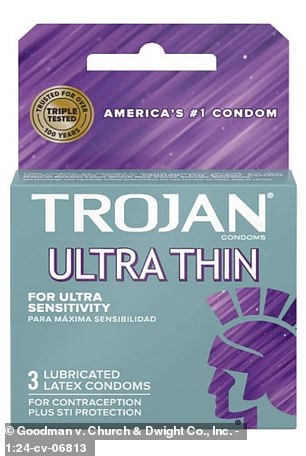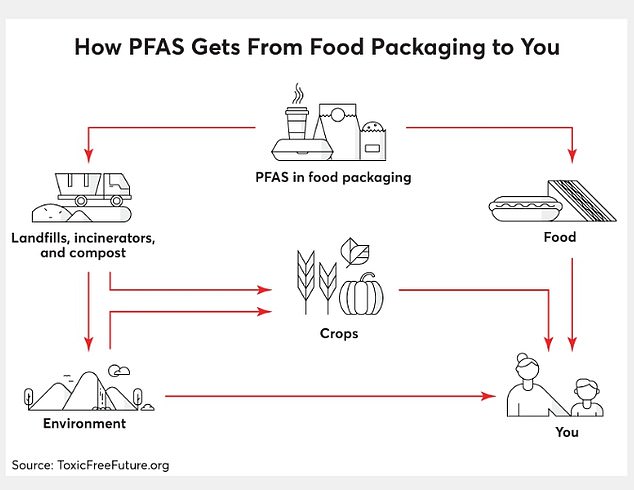Major condom manufacturer sued after chemicals found in its products linked to cancer and infertility
America’s most popular condom brand is being sued after it allegedly failed to disclose that its product contained toxic chemicals.
Matthew Goodman, the only person named in the proposed class action, purchased a package of Trojan Ultra Thin condoms from a New York pharmacy in October 2023. According to the complaint, the package was then sent to an independent lab and found to contain PFAS — microscopic chemicals linked to infertility and cancer.
The lawsuit — which includes 100 anonymous people in addition to Goodman — is against Church & Dwight Company Inc., the manufacturer of the brand, which is worth an estimated $24.9 billion.
The lawyers argued that their clients would not have purchased the product if they had known it contained these chemicals, and that the packaging should have clearly stated these claims.

The lawsuit alleged that the products’ packaging failed to disclose the presence of PFAS. Lawyers said, “Based on the label, he reasonably believed the product was safe for use on his genitals. But the product contained PFAs.”
“Defendants’ false statements, misleading information and material omissions are intentional and careless and render their condoms worthless or less valuable,” the lawsuit, filed in federal court in New York, said.
In recent years, PFAS, also known as “forever chemicals,” have attracted national attention for their widespread use in everything from pesticides to packaging.
Research shows that the vast majority of Americans have at least small amounts of these chemicals in their blood.
Some of these leave the body, but others linger in the bloodstream, building up over time and causing inflammation. That could explain their link to a host of health problems, according to a 2023 study by the University of California Berkeley.
Dr. Linda Birnbaum, a board-certified toxicologist at the National Institute of Environmental Health Sciences, said that PFAS from many different sources have generally been linked to “a huge increase in what are called chronic noncommunicable diseases. Asthma, heart disease, cancer, stroke, premature births. We’re seeing huge decreases and problems with fertility.”
In 2020, Trojan was again the most popular condom brand in the US, with estimated sales to 25 million consumers. according to StatistaCompetitors such as Durex and Lifestyles sold 5.3 million and 6.7 million people respectively.
A pack of 36 Trojan Ultra Thin condoms costs $20.49 through Target. That’s about .57 cents each.
It is unclear how much Mr. Goodman paid when he purchased this product at his local pharmacy in New York.
However, the complaint states that when purchasing the Trojan Ultra Thin condoms, he looked at the product label and saw no notices or statements about PFAS.
The prosecution team sent the condoms to an independent lab for testing and found that PFAS was present in the products. It is unclear whether they only tested the Ultra Thin condoms or if they also tested any of the other 30 types of condoms that Trojan produces.
The lawsuit alleges that if Mr. Goodman and other plaintiffs had known about the presence of PFAS in the products, they would not have purchased the products or would not have purchased them at the same price.
The lawsuit alleges that Trojan can charge a “premium above the price of condoms from competitors and generic manufacturers.”
Mr Goodman has therefore suffered ‘economic loss’ because of ‘misrepresentations and omissions’.
The more than 100 people involved in the lawsuit are therefore demanding damages, which together could amount to more than $5 million in interest and costs.
This is the first time that a class action lawsuit of this kind has been filed against a condom manufacturer.
Separate testing of condoms earlier this year also found PFAS in Trojan products. Regarding that study, Dr. Birnbaum said, “Because condoms are exposures to the most sensitive parts of the human body for men and women, I would strongly encourage the industry to identify and remove these chemicals immediately.”


The above chart from Toxic Free Future shows how toxic PFAS chemicals end up in food products
In recent years, lawsuits have been filed against other consumer goods companies over concerns that their products or packaging may contain PFAS. These include lawsuits against SnappleTarget Bandages and Kerrygold butter.
The lawsuits against Snapple and Kerrygold have been dismissed, and the lawsuit against Target appears to be ongoing.
This is likely due to increased public awareness of the use of permanent chemicals, which are used in the production of plastics, building materials, paints and agricultural chemicals.
From these streams, chemicals from products can enter your body by breathing them in, ingesting them, or applying them to your skin. The molecules are so small that if you are exposed to them in high concentrations, they can pass through pores in your skin and be absorbed into your bloodstream.
The skin on the genitals is thinner and more absorbent than the skin on the rest of the body, and heat can accelerate the absorption of chemicals, the lawsuit says.
The 24-page document states: ‘The female and male genitals have delicate tissues that are more prone to absorbing chemicals than other parts of the body. When condoms are placed on the genitals, PFAS can easily be absorbed.’
Once chemicals enter the bloodstream for good, some of them stick around and build up in the body over time, and can cause the health effects that experts like Dr. Birnbaum highlight.
However, the EPA notes This accumulation probably only occurs in people who are regularly exposed to high concentrations of chemicals, such as factory workers and firefighters.
However, the lawsuit says there should be a warning for condom users who could be exposed to these chemicals when using a Trojan product.
It states: ‘No reasonable consumer would expect that a product marketed for use on genitals would contain dangerous PFAS, which have been unequivocally linked to adverse health effects in humans. Accordingly, Plaintiff and Class Members suffered economic harm as a result of purchasing the product.’
